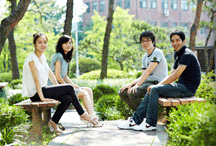Department of Electrical Engineering
In order to produce pragmatic, creative and internationally competitive human resources that can lead the knowledge-based society in the 21st century, the College of Electronics and Information Engineering has established the educational objectives as follows, so that the college may cultivate specific abilities of the students, based on the field-oriented engineering education system in the electronics, information and communication fields.
Department Introduction

The electrical engineering is a field of engineering that deals with electric energy, which is essential for human life and plays a pivot role in the modern industries. The department is offering various lectures related to electric materials and high voltage, power electronics, electronic equipment, electric installation and application, power system engineering, signal processing and system, control and microprocessor application, which are fundamental for electrical engineers. Also, the department has been playing a vital role in the development of electrical engineering and the relevant industrial fields through education, vigorous research activities and industrial-academic cooperations, including maintaining the harmonious balance between theoretical knowledge and practical technologies.
Educational Objectives
"Training qualified engineers with creativity and practical job skills!"The professional programs of electrical engineering(hereinafter referred to as 'Professional Program') is a 'Voluntarily cyclic-type educational system' proposed by the Accreditation Board for Engineering Education of Korea(hereinafter referred to as 'ABEEK'), which has been operated according to the Engineering Accreditation Standards since March 1st 2002. The Professional Program aims at training electrical engineers equipped with scientific thinking and applicabilities based on the comprehensive knowledge in electronic information technology fields, centering on electricity and system fields.
Currently, on the strength of continuous development of electrical and electronic information industry, the necessity of various and enhanced electrical engineering is rapidly increasing.
In order to satisfy such demands, the role of electrical engineering education and importance of professional training has come to the fore. To meet the needs of the times, the educational objectives of professional programs, which put emphasis on practical skills, are as follows.
1. Training engineers equipped with broad and basic science knowledge
2. Cultivating field adaptabilities through reinforcement of experiments and practical training
3. Training electrical engineers equipped with creative system design ability
4. Training electrical engineers equipped with both expertise and sense of responsibility
Sub-majors in Department
Circuits and Systems, Electromechanics and Electrical Property, Electrical apparatus and Power Electronics, Electrical Materials and Electrical Application, Power System and Power IT, Signal Processing and Control, Control Engineering, Renewable Energy System, and so on. Besides the aforementioned majors, the department establishes various basic theories, experiments and practical training courses, which are essential for electrical engineers. And the graduate school has established master's and doctoral courses. The department has been playing a vital role in development of electrical engineering and relevant fields through in-depth education, vigorous research activities and industrial-academic cooperations based on such courses.
Career after Graduation
The graduates are engaged in researches and technology development in excellent local industries or research institutions. And a lot of graduates are going on to graduate schools for master's or doctoral courses. They are playing an important part in the academic fields related to electrical engineering and other relevant fields by acquiring specialized knowledge through more detailed education and researches. Most of the graduates are getting a position in excellent local business, where they are making use of the professional knowledge they have learned from the college. And the number of graduates employed by public enterprises has been increasing year after year.

